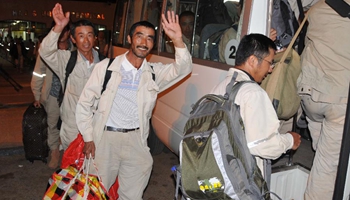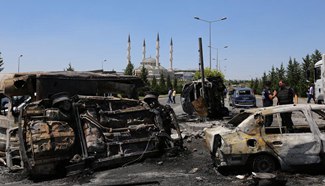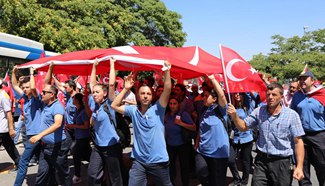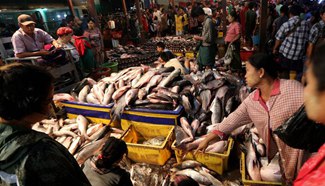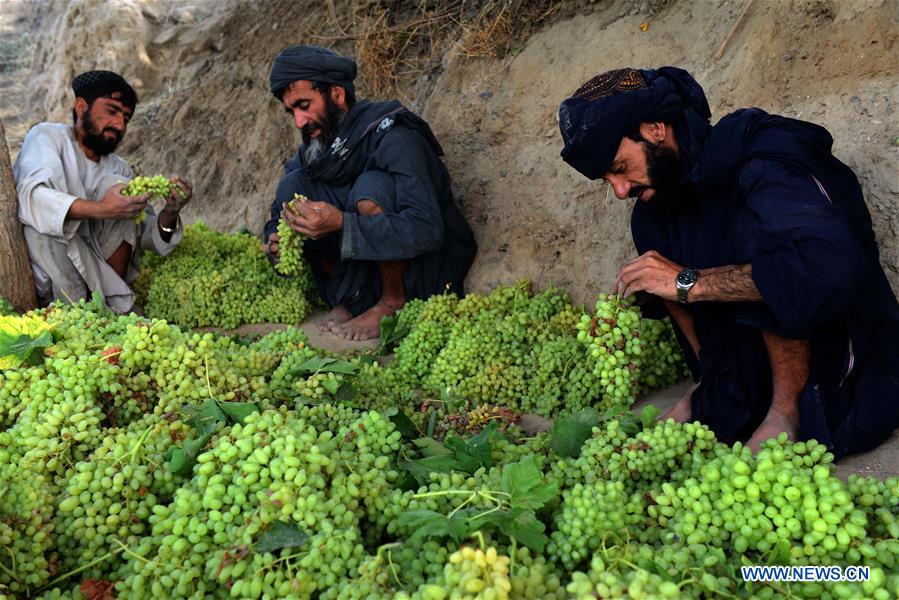
KANDAHAR, July 16, 2016 (Xinhua) -- Afghan farmers work at a vineyard in Kandahar province, southern Afghanistan, July 16, 2016. People in Kandahar abandoned poppy cultivation two years ago and switched nefarious poppy cultivation for grapes as security situation has improved in southern Afghanistan. (Xinhua/Sanaullah Seiam)
by Abdul Haleem, Manan Arghand
KANDAHAR, Afghanistan, July 15 (Xinhua) -- "I am delighted to embark on this new journey of producing grapes to sell to make a living for my family rather than having to produce poppy plants for the drug trade," Ajab Khan, a farmer in the southern Kandahar province, told Xinhua.
While cleaning and packing his produce into cartons, Khan said he was delighted that the improving security situation in Afghanistan had paved the way for him and other villagers to leave the nefarious poppy trade and move into a legitimate, non-lethal and positive agricultural industry that is unconnected to militant groups profiteering off the lucrative drug trade.
"Thank God that today I am supplying grapes to the market instead of poppies as I have been doing in the past," the jubilant Khan told Xinhua.
A resident of Panjwai district, a former Taliban stronghold in Kandahar, the 55-year-old farmer said in the past he had routinely cultivated poppies to earn a living but this year, for the first time, he is harvesting grapes from his own garden to provide for his family.
Once the hub of the opium trade in the southern region, Kandahar, especially the Panjwai district has been transformed into a center for grape farming due to a greatly improved security situation there and in adjoining districts, the vineyard owner told Xinhua.
Kandahar, the birthplace of the hardliner Taliban militants, was the most volatile province until two years ago but nowadays is regarded as the most peaceful province in the restive southern region, according to locals.
"We can freely move from Panjwai to all the districts including Daman, Dand, Arghandab and elsewhere in Kandahar during the day and night free of fear of threat from the Taliban," another farmer, Muslim Khan, said.
While explaining he was content with the amount of produce his vineyard had produced this year, however, he lamented that an as yet sizable market to see to could see some of the grapes spoil in storage, and is calling on the government to help boost the industry for Kandahar-grown grapes.
Kandahar was a region traditionally famous for growing pomegranates and grapes, but unfortunately the protracted war has turned the fruit growing province into a poppy growing hub plagued by militancy and thus damaged its reputation, locals attest.
"The region and its people will regain their glorious reputation in terms of producing grapes and pomegranates if the present circumstances of peace and stability continue," Muslim Khan said.
Recalling his bitter experiences during the Taliban's iron-fisted reign, Khan, 45, said he had no choice but to grow poppies for the drug trade and that the only outcome had been war and poverty.
"If the government were able to ensure security and help us to build cold storage facilities to store our produce in and sell during winter, as well as enhance the market that we sell to, all of us in the region could benefit from increased stability and rising prosperity," Khan explained.
Backing the farmers' viewpoint, Mohammad Noor, the mayor of Panjwai district, confirmed that the rate of fruit and agricultural products has considerably increased over the past two years.
"The return of peace and stability in Panjwai and adjoining districts has paved the way for villagers to return to their homes and once again work on their farmlands and vineyards to revive the region's traditional agricultural industry," Noor told Xinhua.
Thousands of people from the neighboring, volatile regions like Helmand, Zabul and Uruzgan provinces are nowadays flocking to Kandahar to work in the vineyards, Noor claimed, adding that the improving security and increasing agricultural products would eventually help Afghans to embrace lasting peace in their country.






